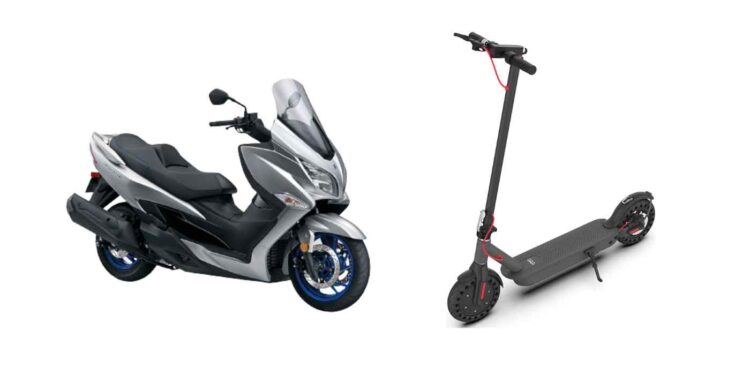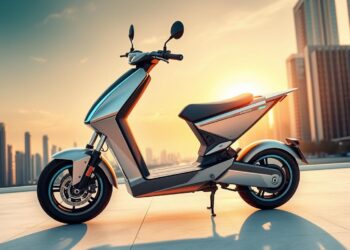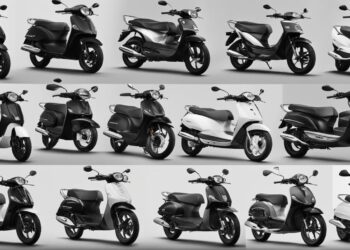As people become increasingly concerned about environmental issues, many are turning to electric scooters as an eco-friendly mode of transportation. However, gas scooters still remain popular due to their speed and convenience. In this article, we will compare electric scooters and gas scooters in terms of cost, convenience, speed, range, and environmental impact, and help you make an informed decision about which one to choose.
Cost
One of the most significant differences between electric scooters and gas scooters is the cost. Electric scooters are generally more expensive than gas scooters, with prices ranging from $200 to $2,000, depending on the brand and features. However, electric scooters are cheaper to operate in the long run, as they require less maintenance and do not require gasoline. On the other hand, gas scooters are cheaper to purchase, with prices ranging from $100 to $1,500, but they require frequent refueling and maintenance.
Convenience
Electric scooters are generally more convenient to use than gas scooters. They are easier to start and stop, and do not require any special skills or knowledge. They are also more lightweight and compact, making them easier to carry and store. Additionally, many electric scooters can be folded up for easy transportation, which is not possible with most gas scooters.
Speed
Gas scooters are generally faster than electric scooters. The average speed of a gas scooter is around 30 miles per hour, while electric scooters have a maximum speed of around 15-25 miles per hour. However, some electric scooters with larger motors can reach speeds of up to 40 miles per hour.
Range
The range of an electric scooter depends on the battery size and the terrain it is ridden on. Most electric scooters have a range of around 10-20 miles on a single charge, while gas scooters can travel up to 100 miles on a full tank of gas. However, electric scooters are more efficient than gas scooters, as they convert energy more efficiently and have fewer mechanical components.
Environmental Impact
Electric scooters are much more environmentally friendly than gas scooters. They produce no emissions and do not contribute to air pollution or global warming. On the other hand, gas scooters emit harmful pollutants such as carbon monoxide and nitrogen oxides, and contribute to smog and climate change.

Maintenance
Electric scooters require less maintenance than gas scooters, as they have fewer mechanical components and do not require oil changes. They also have longer lifespans and require fewer repairs. However, electric scooters do require periodic battery replacements, which can be expensive.
Safety
Both electric scooters and gas scooters can be safe if ridden responsibly and with proper safety gear. However, electric scooters are generally safer than gas scooters, as they have a lower top speed and are more lightweight. They also do not emit harmful fumes or liquids, which can pose a safety hazard in the event of an accident.
Noise Pollution
Gas scooters produce a significant amount of noise pollution, which can be disruptive and annoying to others. Electric scooters, on the other hand, are much quieter and produce little to no noise.
Legal Regulations
Electric scooters are subject to different regulations than gas scooters in many areas. Some cities allow electric scooters to be ridden on some bike paths and sidewalks, while others prohibit them altogether. Gas scooters are generally subject to more stringent regulations, and may require licenses, insurance, and registration. It is important to check local regulations before purchasing and riding either type of scooter.
Durability
Electric scooters are generally more durable than gas scooters, as they have fewer moving parts and do not require as much maintenance. They also have longer lifespans, and can last for several years with proper care. Gas scooters, on the other hand, require frequent maintenance and may require more repairs over their lifespan.
Storage
Electric scooters are more convenient to store than gas scooters, as they are smaller and more lightweight. Many electric scooters can be folded up for easy storage in a closet or small space. Gas scooters are generally larger and heavier, and may require a garage or outdoor storage space.
Resale Value
Electric scooters generally have a higher resale value than gas scooters, as they are more environmentally friendly and require less maintenance. They also have longer lifespans and can be used for several years without significant wear and tear. Gas scooters, on the other hand, may have lower resale values due to their environmental impact and frequent maintenance requirements.
Conclusion
In conclusion, both electric scooters and gas scooters have their advantages and disadvantages. Electric scooters are more environmentally friendly and require less maintenance, but are generally more expensive and have a lower top speed and range. Gas scooters are cheaper and faster, but produce harmful emissions and require more maintenance. It is important to consider your personal needs and preferences before making a decision about which type of scooter to purchase.
FAQs
- Are electric scooters more expensive than gas scooters?
- Yes, electric scooters are generally more expensive than gas scooters, but are cheaper to operate in the long run.
- Can electric scooters travel as fast as gas scooters?
- No, electric scooters generally have a lower top speed than gas scooters.
- Are electric scooters safer than gas scooters?
- Electric scooters are generally safer than gas scooters, as they have a lower top speed and are more lightweight.
- Do electric scooters require less maintenance than gas scooters?
- Yes, electric scooters require less maintenance than gas scooters, as they have fewer mechanical components and do not require oil changes.
- Are there legal regulations for riding electric scooters and gas scooters?
- Yes, both electric scooters and gas scooters are subject to different regulations in different areas. It is important to check local regulations before purchasing and riding either type of scooter.


















